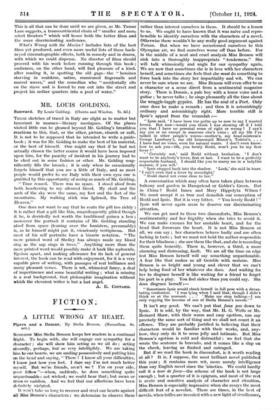MR. LOUIS GOLDING.
THESE sketches of travel in Italy are slight as to matter but luxuriant in manner—literary meringues. Of the places visited little can be gleaned beyond Mr. Golding's breathless reactions to this, that, or the other, picture, church or café. It is not to be supposed that he intended to write a guide- book ; it was for Mr. Golding to make the best of his material, or the best of himself. One might say that if he had not actually chosen the latter course it would have been imposed upon him, for the paucity of incident in his journey had to be eked out in some fashion or other. Mr. Golding mag- nificently fills the breach ; it is only when he occasionally forgets himself that you see a little of Italy, and as most people would prefer to see Italy with their own eyes one is gratified by this opportunity of seeing so much of Mr. Golding.
"Time ceased. There was no space. I stood aloof from both hearkening to my silenced blood. My skull and the arch of the sky were the same, my feet and the feet of the mountains. My walking stick was Igdrasil, the Tree of Heaven."
One does not want to say that he coats the pill too richly : it is rather that a pill like this, magniloquently gilded though it be, is decidedly not worth the traditional guinea a box ; moreover the portrait it contains of Mr. Golding standing aloof from space (leaning over the banisters, presumably) is, as he himself might put it, vicariously vertiginous. But most of his self portraits have a bizarre notation. "The mere printed word of Shelley has always made my blood sing as the sap sings in trees." Anything more than the mere printed word would possibly make it bark like a phoenix. Egoism apart, and making allowance for its lack of general interest, the book can be read with enjoyment, for it is a very capable piece of writing, with passages of real brilliance and many pleasant verses. There is wit, whimsical fancy, a deal of impertinence and some beautiful writing ; what is missing is a real background, that philosophic imagination without which the cleverest writer is but a lost angeL
A. E. COPPARD,










































 Previous page
Previous page